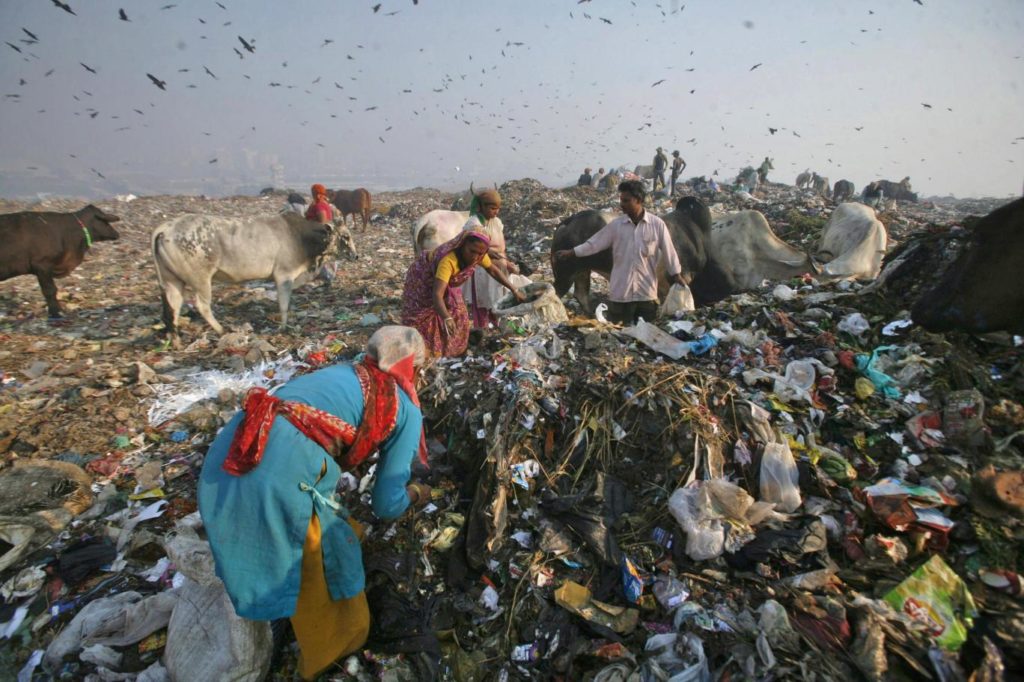India Just Banned All Forms of Disposable Plastic in Its Capital
ENVIRONMENT, 13 Feb 2017
Ian Johnston – The Independent
National tribunal prohibits use of cutlery, bags and other plastic items amid concern over pollution of the sea and air.

Waste collector Saudagar Mukherjee and his daughter Madhuri collect recyclable material at the Ghazipur landfill in New Delhi. Reuters
25 Jan 2017 – India’s capital city Delhi has introduced a ban on disposable plastic.
Cutlery, bags, cups and other forms of single-use plastic were prohibited by the National Green Tribunal (NGT).
There is particular concern in the country about the amount of plastic waste it produces. According to the Times of India, it is responsible for an astonishing 60 per cent of the plastic that is dumped in the world’s oceans every year.
The ban affects the whole National Capital Territory (NCT) area of Delhi.
It was introduced after complaints about the illegal mass burning of plastic and other waste at three local rubbish dumps, which has been blamed for causing air pollution. The sites are supposed to operate as waste-to-energy plants.
The Tribunal said in a statement: “Each of these sites is a depiction of the mess that can be created for environment and health of people of Delhi.
“We direct that use of disposable plastic is prohibited in entire NCT of Delhi.
“The Delhi government shall take steps for storage and use of plastic materials.”
The ban came into force at the start of this month.
“All the corporations … and other public authorities, including NCT of Delhi, are directed to take immediate steps for reduction and utilisation of dumped waste,” the Tribunal added.
After Theresa May visited India in November last year, analysts commissioned by Greenpeace calculated the air pollution was so bad it probably had slightly shortened her lifespan.
She was exposed to air that was 36 times more toxic than in London during the three-day trade mission to Delhi.
________________________________________
Read more:
- How not recycling plastic is damaging our oceans
- Government considering plastic bottle tax to tackle waste
- The US state that banned banning plastic bags
- Sea birds’ taste for plastic traced to ‘compound smell’
Go to Original – independent.co.uk
DISCLAIMER: The statements, views and opinions expressed in pieces republished here are solely those of the authors and do not necessarily represent those of TMS. In accordance with title 17 U.S.C. section 107, this material is distributed without profit to those who have expressed a prior interest in receiving the included information for research and educational purposes. TMS has no affiliation whatsoever with the originator of this article nor is TMS endorsed or sponsored by the originator. “GO TO ORIGINAL” links are provided as a convenience to our readers and allow for verification of authenticity. However, as originating pages are often updated by their originating host sites, the versions posted may not match the versions our readers view when clicking the “GO TO ORIGINAL” links. This site contains copyrighted material the use of which has not always been specifically authorized by the copyright owner. We are making such material available in our efforts to advance understanding of environmental, political, human rights, economic, democracy, scientific, and social justice issues, etc. We believe this constitutes a ‘fair use’ of any such copyrighted material as provided for in section 107 of the US Copyright Law. In accordance with Title 17 U.S.C. Section 107, the material on this site is distributed without profit to those who have expressed a prior interest in receiving the included information for research and educational purposes. For more information go to: http://www.law.cornell.edu/uscode/17/107.shtml. If you wish to use copyrighted material from this site for purposes of your own that go beyond ‘fair use’, you must obtain permission from the copyright owner.